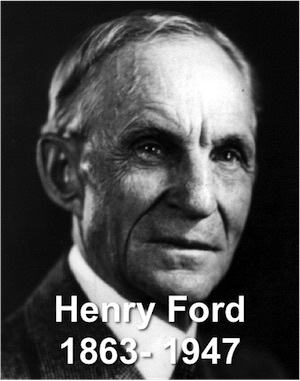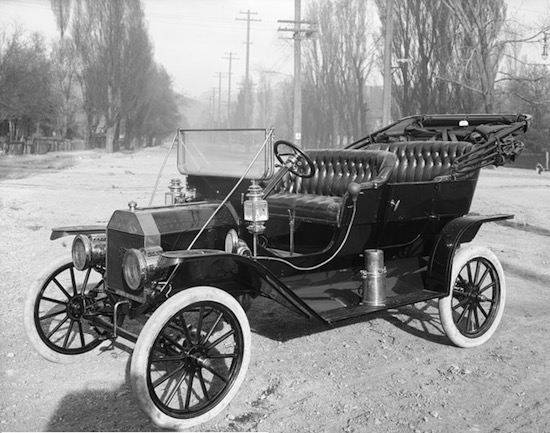Henry Ford was an industrialist, an inventor, and an expert engineer. But by all accounts, he was a poor manager.SO what is he doing here?
Well, there is more to management than the cuddly stuff, and sometimes it is important t recognise the innovations that we take for granted.

Short Biography
Henry Ford was born and grew up in rural Detroit, where he had a precocious interest in all things mechanical, from watches to engines. He left school at 16, and rather than work on the family farm, he took several engineering jobs until, in 1896, he became Chief Engineer at the Edison electrical factory in Detroit.
With a small amount of business school education behind him, and a prototype automobile in the barn at home, he pitched the idea of selling automobiles to Edison. He received encouragement but little more. It was only when he entered and drove his own car at the Grosse Pointe automobile races in 1901 and 1902, that he received the interest and financial backing he needed to start manufacturing. He won, two years running.
This allowed Ford to start up the Ford Motor Company in 1903. He launched with the Model A Fordmobile in 1905, which he sold for far less ($850) than any of his competitors sold their rival models. In 1908, Ford replaced the Model A with the Model T, which wen on to sell over 14 million vehicles before withdrawal in 1929.

During that time, Ford also built a car that achieved the world land speed record with an average speed of over 90 mph. In 1919, Ford handed over presidency of the company to his son, Edsell, who held it until his early death in 1943. Ford returned briefly to the company, before handing it to his grandson in 1945. He died two years later in 1947.
Henry Ford: The Good, the Bad, and the Ugly
In management terms, Ford could be characterised as a paternalistic, moralising pragmatist.
He saw early the value of a stable labour force. Recognising high turnover rates in increasingly unrewarding production-line jobs, Ford set higher pay rates than his competitors. This attracted and held workers, as he hoped. He also increased specialisation on the production line and made many innovations to simplify and speed up processes, doubling through-put while reducing labour.
Ford invented neither the production line, nor the automobile, but he did revolutionise the use of both. He also set up a sociological department within the business. Its role was to oversee the hygiene and behaviour of workers, deciding who would be eligible to receive profit shares.
On a more benign paternalistic note, he also built an experimental model village for workers, outside the city, which he conceived as a form of rural idyll. This accompanied a strong emphasis on workers’ welfare. Ford was also a well-known pacifist during World War 1, although his son, Edsell, bowed to the nation’s need for warplanes during the Second World War, and established a plant that built a B24 bomber every hour, which Ford continued to operate after his son’s death, producing over 85,000 bombers in all.
Despite Ford’s determination to pay his workers well, he resisted unionisation for many years. Indeed it was only two years after a law was passed in 1935, that he finally allowed unionisation in 1937.
It is important to mention the ugly side of Ford too. In 1918, Ford bought a local newspaper called the Dearborn Independent. It seems his primary purpose was to publish a series of nearly 100 anti-semitic articles. He later republished these as a four-volume book series. Whilst you could argue that his ideas about Jewish capitalist conspiracies were not uncommon in early twentieth century America, his own prominence and links to other major industrialists like Henry Firestone, lent the ideas more legitimacy than they may otherwise have received. Ford received a high award from pre-war Nazi Germany, and his book was cited as an influence by Nazis tried at Nuremberg.
So what can we learn from Henry Ford?
The obvious lessons are these. If you can create a better, cheaper version of a product than your competitors, you can rapidly achieve market dominance. But if you fail to keep on innovating, you can squander much of it – General Motors overtook Ford in the late 1920s.
And I shan’t even try to moralise about the obvious lessons regarding Ford’s politics.
But the real lesson – and a very modern one – seems to be this. We think of Ford as a great industrialist, but above all he was two things: a great engineer and inventor, and a pioneering entrepreneur who was driven to take his product to market, and optimise that product and how it was produced. In this, he resembles others in our series, like Bill Gates, Steve Jobs, David Packard, and Eiji Toyoda. Innovation and business building often start with that vital combination of expertise and passion. And that continues today.
